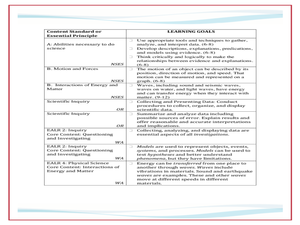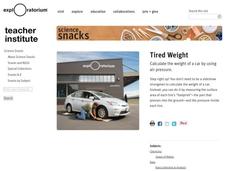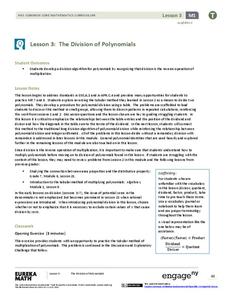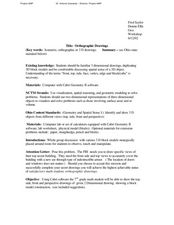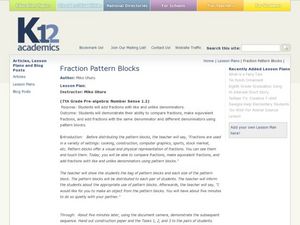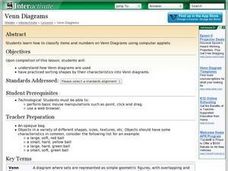Curated OER
Conditions at Sea Introductory Activity, Making Waves
Students explore waves and wind. In this physical and earth science wave lesson plan, students participate in a wave making activity with an aquarium and a hair dryer. Students complete a data chart recording wave height and related...
Curated OER
Computer Tracks Lunch Choices
Students read a story called Computer Program Tracks Lunch Choices and answer vocabulary and comprehension questions about it. In this current events literacy lesson plan, students respond to literature by answering questions, recalling...
Curated OER
Counting With Bears
Students use gummy bears to count in this lesson. They sort the gummy bears into color groups. They then count the gummy bears in each grouping. Finally, they survey their classmates' favorite color of gummy bears and record this...
Curated OER
Conversation Lesson: Internet Craze
Learning to support your opinions, debate, build arguments, and effectively respect another's point of view are vital skills. Learners work through a series of topics to practice discussion engagement and verbal communication.
Exploratorium
Tired Weight
Take your class out to visit your automobile and use the tires to compute the weight of the vehicle. This is done by measuring the surface of the tire meeting the ground and the air pressure. This is a fun lesson in the relationship...
Curated OER
Chisanbop (Korean Counting to 99)
Students practice their counting skills. For this counting lesson, students discover the Chisanbop method of counting which allows them to quickly count to 99 using their hands.
EngageNY
The Division of Polynomials
Build a true understanding of division of polynomials. Learners use their knowledge of multiplying polynomials to create an algorithm to divide polynomials. The area model of multiplication becomes the reverse tabular method of division.
Curated OER
Physical Education Meets Geometry
Students create geometric shapes with a jump rope. In this interdisciplinary lesson, students review the different shapes while getting some physical activity.
Curated OER
Tessellation Trial and Error
In this interactive lesson, young scholars review attributes of equilateral polygons. They are introduced to the concept of a tessellation. Using protractors and pre-cut shapes, students arrange a variety of tiles to create...
Curated OER
Whatcha Gunna Do When the Hulkster's Measuring Too??
Pupils measure using tools they have made. In this algebra lesson plan, students measure the height and distance using non-traditional measuring methods. They apply their findings to algebra and trigonometry properties of measurements.
Curated OER
Activity Plan Mixed Ages: Exploring Play Dough
Students learn to prepare a play dough recipe in order to enhance their measurement, reading, and creative-thinking skills. In this instructional activity on making play dough, students measure and add the different ingredients, while...
Curated OER
Orthographic Drawings
Learners investigate the creation of three dimensional drawings. In this geometry instructional activity, students analyze and complete orthographic drawings. They Cabri software to manipulate and move the drawings around.
Curated OER
Orthographic Drawing
Students investigate orthographic drawings. In this geometry lesson, students identify properties of three dimensional drawings in space. They solve problems using volume and area formulas.
Curated OER
Which Tape is Stickiest?
Students conduct an experiment to determine which style of tape will stick the best. For this controlled experiment lesson, students predict which tape will stick best to a marble that rolls over it, then they conduct the experiment and...
Curated OER
Watershed Model
Young scholars view a presentation of water and land and how we need to protect our water resources. In this water lesson plan, students discuss how we rely on water, and complete activities in all subjects related to water.
Curated OER
Fraction Pattern Blocks
Seventh graders practice using pattern blocks. In this pre-algebra lesson, 7th graders complete tasks that require them to compare fractions, make fractions equivalent, and add fractions.
Curated OER
Chemical Wonders
Learners read about and discuss how chemical engineers use different states of matter to create substances. In this chemical engineering lesson plan, students also give examples of the 3 kinds of matter.
Curated OER
Proportions in Flight
Sixth graders calculate wingspan and the body length of the birds and understand how they relate to how the bird flies. In this wingspan lesson plan, 6th graders also calculate their own "wing span" with their arms.
Curated OER
Perfumania
Students identify various geometric shapes. Apply the given formulas to determine the volume of these shapes. Design their own container to conform to specifications provided. Use their knowledge of volume formulas and shapes to compute...
Teach Engineering
Aerogels in Action
Model an oil spill cleanup. An engaging engineering lesson has groups using aerogels to simulate an oil spill cleanup (vegetable oil in water). Along the way, they learn about nanotechnology and hydrophilia/hydrophobia.
Gwinnett County Public Schools
Analysis of the Tuck Everlasting and The Birchbark House Text Exemplars
Looking to introduce some text-based questions into your ELA lessons? Practice the kinds of skills the Common Core demands with the seven text-based questions and the essay prompt provided here. Designed to be a three-day lesson, day one...
Baylor College
Using Food Labels
Help your class make sense of nutrition labels with the ninth lesson of this series. After explaining the different information provided on packaged food labels, perform an activity that demonstrates the amount of sugar in a single can...
Curated OER
Using the Correct Vocabulary to Solve Problems
Third graders examine the vocabulary and strategies to be used with addition, subtraction, and multiplication word and story problems. They observe the teacher solve a variety of problems, then write and illustrate their own original...
Curated OER
Venn Diagram Lesson Plan
Students use Venn diagrams in order to classify different objects and numbers. They then use "Venn Diagram Shape sorter" applets on the computer.


